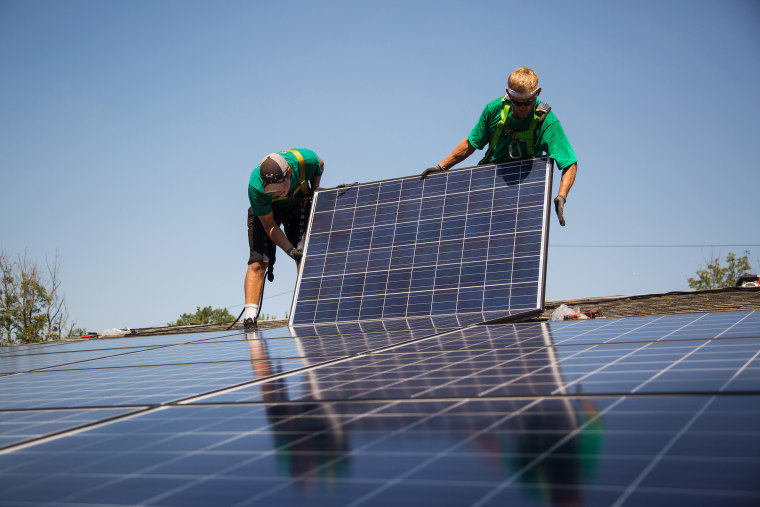The Covid-19 relief bill that President Donald Trump signed on Sunday includes legislation to fund investments in clean energy technologies and regulate climate-warming greenhouse gases — a step that offers some hope for the bigger climate ambitions of President-elect Joe Biden.
The legislation, as part of the Omnibus Appropriations Bill that was included within the Covid relief deal, authorizes $35 billion in spending over the next five years on solar, wind and other clean power sources. It also includes new regulations aimed at phasing out a planet-warming coolant called hydrofluorocarbon that is often used in refrigerators and air conditioners.
"This is the most significant piece of climate and energy legislation enacted by Congress in at least a decade," said Dan Lashof, director of the World Resources Institute, a Washington-based global research nonprofit.
The climate policy within the 5,593-page bill attracted support from prominent members of both parties in Congress.
"Republicans and Democrats are working together to protect the environment through innovation," Sen. John Barrasso, R-Wyo., chairman of the Senate Environment and Public Works Committee, told The Associated Press.
"These measures will protect our air while keeping costs down for the American people,″ he added.
The funding comes ahead of what is expected to be a significant climate push from Biden, who campaigned on a $2 trillion plan to modernize the U.S. energy system and achieve a 100 percent clean electricity standard by 2035. Biden has also said he plans to have the U.S. re-enter the Paris climate accord.
And while Biden does have some Republican allies in his fight against climate change, pushing through significant legislation is expected to be challenging. Gina McCarthy, the former Environmental Protection Agency chief who Biden has tapped to lead his climate efforts, said in an interview that Biden will have options as president if Congress resists his efforts.
"I know people are worried about what we can do legislatively, but there's so much that you can do with executive authority," McCarthy said. "It's the federal government that decides how it is going to advance the budget that is given by Congress."
McCarthy said Biden could target greenhouse gases on Day One.
"I think we can do a lot with executive orders," she said. "You can do a lot on the mitigation side to reduce greenhouse gases with work to begin immediately."
The legislation included in the Covid-19 relief bill gives those efforts a head start by targeting hydrofluorocarbons, or HFCs, which make up a small percentage of the greenhouse gasses in the atmosphere but are considered extremely dangerous because they have a thousand times the heat-trapping potency of carbon dioxide.
The law makes the U.S. consistent with the Kigali Agreement, an October 2016 deal reached by 197 nations to eliminate HFCs. During his presidency, Trump never ratified the agreement, which is seen by climate activists as a crucial part of the broader fight against global warming.
"All together the Kigali Amendment is projected to reduce global warming by 0.5 degrees Celsius, or almost 1 degree Fahrenheit," Lashof said.
McCarthy said these kinds of steps are key to reintroducing the U.S. as a global leader in the fight against climate change.
"I think we'll be welcomed with open arms," said McCarthy, who was also a negotiator on behalf of the U.S. for the Kigali Agreement, "I think people are waiting for the U.S. to rejoin and to again play a leadership role."
In addition to its HFC regulation, the legislation extends tax credits for solar and wind power companies, originally set to expire at the end of the year, by two years. It also puts money behind research into new "grid technology" to store energy and the removal of carbon dioxide from the atmosphere produced by power and manufacturing plants.
Lashof called the bill a "very positive way to end a very difficult year."
